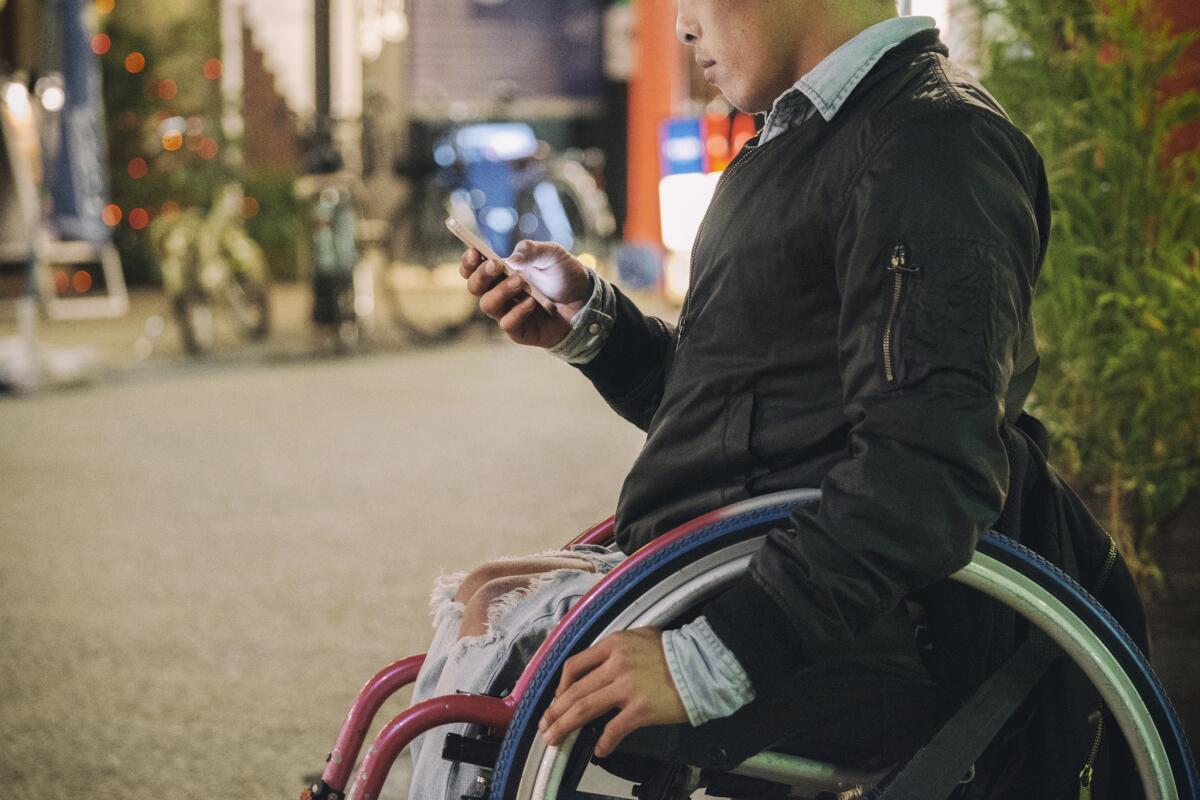These apps help defeat barriers and keep you on the road

- Share via
Of all the memories of my first trip to New Orleans, this stands out: wandering through the French Quarter in search of an upscale restaurant that offered wheelchair access.
After several failed attempts, I arrived at a lovely Bourbon Street establishment that had a level entrance, meaning no steps at the front door. Dinner was sublime, but the frustration beforehand left a sour taste.
If you want to enjoy the former and avoid the latter, there may be an app for that. In fact, finding the right apps may save you time, money and aggravation when accessibility is non-negotiable.
Thanks to my iPhone and a mobile app called Access LA (the “LA” stands for Louisiana) that provides disability access information on a slew of businesses, I was able to reframe my experience on a return trip in February.
The app, launched in 2015 by the Advocacy Center of Louisiana (available for iOS, and, soon Android), aims to help people with disabilities avoid aimless wandering.
“We want to arm people with information that they can use to experience our openness and our welcoming environment, without pretending there aren’t some real barriers,’’ said Susan Meyers, director of policy and community engagement at the advocacy center.
When the hotel staff recommended a place for gumbo on my most recent trip, I consulted Access LA to see what locals with disabilities were saying. Although the entrance and interior were accessible, the restrooms presented some obstacles. I went with a different option.
Lots of savvy travelers use mobile apps to plan and manage trips. Some of those apps are designed for people with disabilities, but many others have features that make them useful in tracking a variety of accessibility needs.
I favor apps that have been developed, tested, reviewed or promoted by the disability community. We are, after all, the experts on access.
To ensure you get the expertise you need for your trip, reach out to a local disability advocacy organization or assistive technology center either in your hometown or your destination, and ask about mobile apps that can help you navigate the area, visit points of interest and find reliable, accessible transportation.
For example, in Chicago the Open Taxis app (iOS and Android) lets you request wheelchair-accessible cabs for immediate pickup (usually within 15 minutes) or prearrange your transportation. I used this app during business trips in 2016 and 2017, and it was solid.
“We are definitely driving tourism,’’ said Eric Lipp, executive director of Open Doors Organization, a disability travel and tourism organization that developed the app. Dispatchers booked more than 90,000 accessible rides in Chicago in 2017, Lipp said
“People have events here because they know they can get accessible transportation,” he said.
Maybe you don’t have a specific trip in mind but just want to explore some mobile apps. In that case, check BridgingApps.com, a program of Easter Seals Greater Houston that has a database of accessible apps that have been reviewed by people knowledgeable about various types of disabilities.
If you’re curious about an app not listed at BridgingApps, submit a request for the organization to review it through its Facebook page.
“We want to be a welcoming and trusted place for people to find apps,” said Jana Rodriguez, a digital trainer for BridgingApps.
She has helped veterans living with post-traumatic stress disorder learn to use Google Street View, a feature of Google Maps and Google Earth (iOS and Android), to get a panoramic image of a place before deciding whether to go in.
“All of the anxiety that builds up being in crowds, being in small places, being in parking garages can all be triggers,’’ Rodriguez said. “Google Maps helps with peace of mind to resolve that anxiety before you get there.”
Access needs, like disability itself, are highly individualized. Figure out what issue you’re solving — booking an accessible hotel, visiting attractions that have accessible features or planning a night out on the town — and then look for an app that fits.
An ideal travel app for people with cognitive disabilities, for example, would have a simple interface, use plain language, and have reminders for food, water and meds, said Noor Pervez, community engagement coordinator with Autistic Self Advocacy Network.
It would be helpful, Pervez said, to have all these things integrated into one app “so that we could have access to step-by-step instructions for every phase of travel.”
If you are blind or visually impaired and plan to travel to a place you’ve never been, seek a full-featured app that provides more detail on the environment, said Aaron Preece, managing editor of AccessWorld Magazine, a technology news mag published by the American Foundation for the Blind.
“Everyone is going to be different,” said Preece, who is visually impaired and travels frequently for work and leisure, “but from my perspective I want to have a more concrete idea of the kind of obstacles I may encounter.’’
As with any app, you can uninstall if it doesn’t work for you or when the trip is over.
Where to find apps
Whatever your disability, try to match the technology to your travel goal, said Patrice Wheeler, an assistive technology specialist at Cal State Northridge’s Disability Resources and Educational Services office.
One app often leads you to others, and that is part of the journey.
“On your wanderings you will find these great apps, but you will also find other people using them so it creates a community of shared knowledge and shared value of traveling together,” said Wheeler. “It’s an educational moment. You become an ambassador for leveling and accessibility.”
Here are some apps that can help.
For mobility device users, Wheeler likes that “wheelchair access” is an option for navigation in Google Maps (iOS and Android).
Looking for places to go in a particular city? Crowd-sourced apps such as AccessEarth will tell you how a business rates on everything from barrier-free entrances, to wheelchair-height tables and accessible restrooms.
“This is the one app I’ve latched onto. The aesthetic speaks to me and it’s user-friendly,’’ said Alanna Raffel, an occupational therapist from Philadelphia who has rated dozens of businesses in the vibrant downtown area known as Center City District.
“I’m often inviting friends who use wheelchairs out to lunch and finding places are not accessible,” she said. The app helps mitigate some of that frustration.
Access Earth focuses on physical mobility and reviews are heavily concentrated in Philadelphia and Dublin, Ireland. Updates will soon include information useful to people who have sensory or cognitive disabilities.
It’s hoped that mapping events planned this summer will drive more robust use among people in major U.S. and European cities, said Matt McCann, Access Earth’s founder and chief executive.
“The goal is to be the most accessible accessibility app,” said McCann, who has cerebral palsy.
Aaron Preece of the American Foundation for the Blind suggests these for people with visual impairments:
Indoor navigation using low-energy Bluetooth beacons has also become popular. Some examples of apps using this technology:
Noor Pervez, community engagement coordinator with Autistic Self Advocacy Network, offers this list of apps that addresses a variety of needs.
More to Read
Sign up for The Wild
We’ll help you find the best places to hike, bike and run, as well as the perfect silent spots for meditation and yoga.
You may occasionally receive promotional content from the Los Angeles Times.






